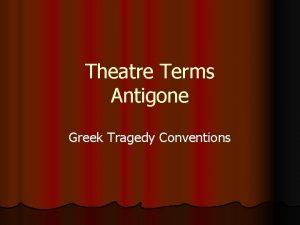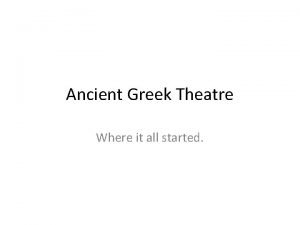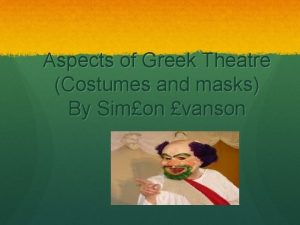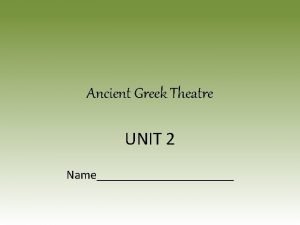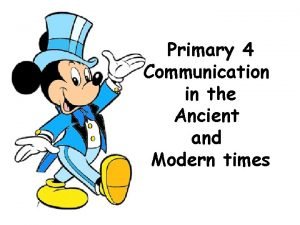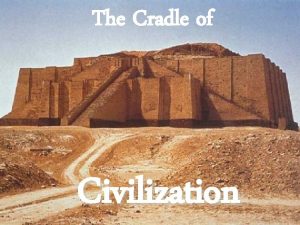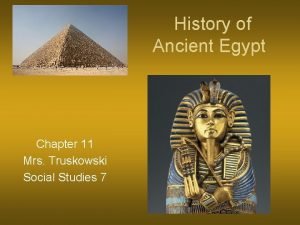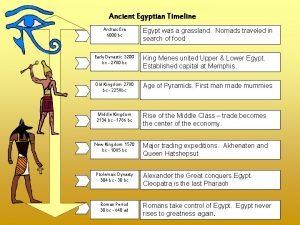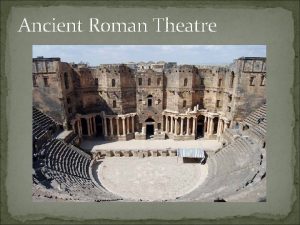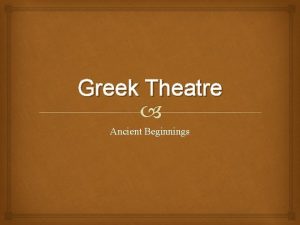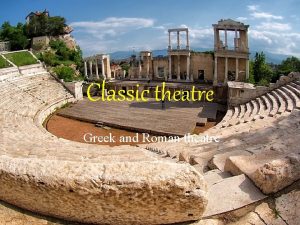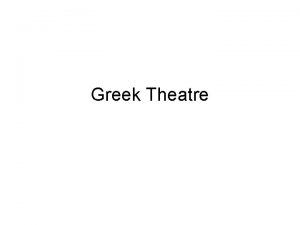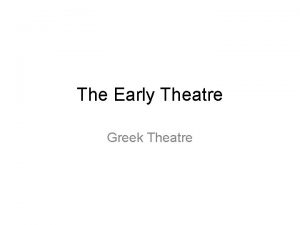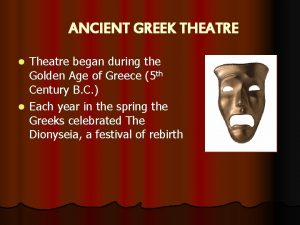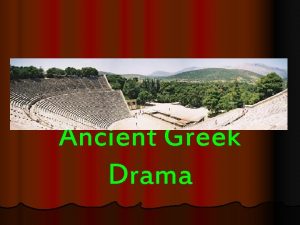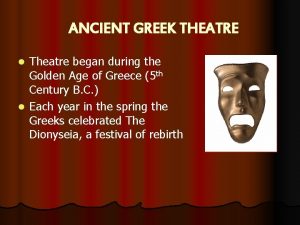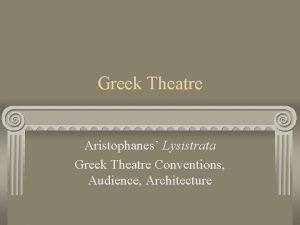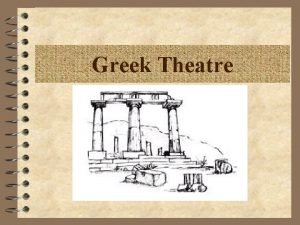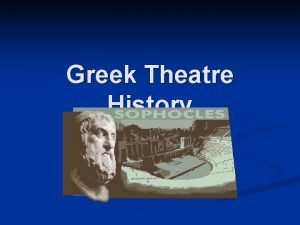The Greek Theatre Timeline o Ancient Greek theatre

















- Slides: 17

The Greek Theatre

Timeline o Ancient Greek theatre flourished in the 5 th and 4 th centuries B. C. o During this time, Greece was defeating the Persians in numerous wars. o Athens became the centre of Greek power and culture. o This period is known as ‘Classical Greece’ o Much of the West’s thinking, politics, and philosophy comes from this society

Origins of the Theatre o Initially, Greek drama was performed in village festivals. It soon moved to Athens and became a major annual event and competition. o Dramatists were asked to submit four plays – three tragedies and one comedy. o The plays would be performed over three days, and a prize would be given on the third day for the winner. This was one of the greatest honours an Athenian could receive.

Staging o Greek theatres were always outdoors. o The stage consisted of an orchestra for the chorus and a stage for the actors. A ‘skene’ (scene) was introduced – a backdrop or wall that stood behind the stage. o This later became a stone construct and is where today’s proscenium originates. o The theatres were carefully constructed to maximise acoustics.



Actors o Originally, plays were just a Chorus – a group of 50 speakers who recited a story in verse o Traditional drama really began when an actor named Thespis had the idea for one person to break away from the chorus and reply to what they said. o The chorus quickly shrank to 15 speakers, with three actors performing on stage.

Actors o The Chorus would narrate the drama and comment on what was happening. They would be asking the questions the audience would want to ask. o Meanwhile, three actors would be on stage performing numerous roles

Masks and Costume o The actors would change roles by using masks. o They would be made of natural materials such as wood, linen, leather, or cork. Human or animal hair would be used for a wig. o The mouth would be wide to magnify the actor’s voice. o They were designed to show age, gender, and emotion.


Masks and Costume o Costumes also helped the actors change role. They would wear robes in striking colours o The audience would associate certain attributes with costumes, e. g. purple for royalty, trailing robes for grief, a hat signified a character was taking a journey

The Chorus o The Chorus is one of the most famous relics of the Greek theatre o Its purpose was to speak in unison, effectively as one loud voice o The Chorus would comment on what was happening, express an opinion, or narrate the story. Occasionally, an individual would come forward from the Chorus to speak o The Chorus would represent a group of people within the context of the play – e. g. Elders

The Chorus o The chorus would wear plain masks and plain robes to distinguish them from the main actors o Their function was aural, not visual. o They would stay in the Orchestra while the actors remained on stage.

Summary o Greek theatre flourished in the 5 th and 4 th Centuries B. C. o Stages were outdoors and the audience were sat in a semicircle around the stage o A maximum of three actors were used in the drama, with 15 speakers in the Chorus o The chorus narrates and comments on the drama. They speak in unison o Masks and costumes were used to distinguish between the actors’ various roles

Sophocles o Sophocles was one of the most famous Greek playwrights o He regularly won the competitions at theatre festivals o He wrote a very famous tragedy called ‘King Oedipus’ or ‘Oedipus Rex’

Aeschylus o Aeschylus was the first of classical Athens’ great dramatists. o He grew up in the turbulent period when the Athenian democracy had to prove itself against both self-seeking politicians at home and invaders from abroad. o Aeschylus himself took part in his city’s first struggles against the invading Persians. o His most famous plays are the Oresteia and The Persians.

Euripides o last of classical Athens’ three great tragic dramatists, following Aeschylus and Sophocles. o He was the least successful of the three in competitions. However more of his plays have survived. o Aristophanes regularly poked fun at him in his comedies, showing his disdain but perhaps also proving Euripides’ importance.
 Ancient greece theatre masks
Ancient greece theatre masks Conventions of a greek tragedy
Conventions of a greek tragedy Three ancient greek tragedians
Three ancient greek tragedians Theatre bio
Theatre bio Greek theater costumes
Greek theater costumes Ancient greek theatre architecture
Ancient greek theatre architecture Theatre masks name
Theatre masks name Greek amphitheatre
Greek amphitheatre Ancient india vs ancient china
Ancient india vs ancient china Ancient ways of communication
Ancient ways of communication Mesopotamia timeline
Mesopotamia timeline Timeline of ancient egypt
Timeline of ancient egypt Timeline of ancient egypt
Timeline of ancient egypt Ancient roman plays
Ancient roman plays Medieval theatre timeline
Medieval theatre timeline Medieval theatre timeline
Medieval theatre timeline Roman theatre timeline
Roman theatre timeline Medieval theatre history
Medieval theatre history

